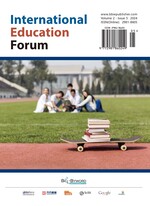Abstract
Course ideological and political education is not a rigid combination of curriculum and ideological and political elements, but a systematic project that requires continuous restructuring, design, and construction of course content. This article takes the fourth lesson of the Comprehensive Japanese 2 course as an example of designing ideological and political education based on the BOPPPS model. The ideological and political elements are integrated into each aspect of the teaching silently, in order to enable students to naturally accept the guidance of socialist core values and achieve the goal of cultivating morality and nurturing people.
References
Wu C, Zhang B, 2019, Five Dimensions of Ideological and Political Work Running Through the Entire Process of Education and Teaching. Research on Ideological Education, 2019(09): 121–124.
Ministry of Education, 2020, Guidelines for the Construction of Ideological and Political Education in Higher Education Courses. New Education, 2020(19): 32.
Wang F, 2010, Discussion on the Problems and Countermeasures of Ideological and Political Education in Higher Vocational Education. Vocational Education Forum, 2010(02): 38–39 + 42.
Ruan H, 2024, Empowering the Cultivation of High-Quality Talents in New Productive Forces through the Construction of Ideological and Political Courses. Xinhua Daily, 2024-04-26(015).
Shi Z, Nie S, Qu C, 2019, Let Ideological and Political Courses Enter the Hearts of Students. Jiangxi Daily, 2019-07-29(011).
Liu H, Teng M, Zhang P, What are the Difficulties of Blended Learning Design–Analysis of Blended Online and Offline Teaching Design Scheme Based on Rasch Model. China Higher Education Research, 2020(10).
Gao B, Liu X, Yang T, et al., 2022, The Application of BOPPPS Teaching Model in the Teaching of Marine Medicinal Bioresources. Science and Education Journal, 2022(19): 69–71.
Liang J, Yi P, 2021, Blended Teaching and Practice of Nursing English under the BOPPPS Model. Journal of Chengdu University of Traditional Chinese Medicine (Education Science Edition), 2021(02).
Peng Q, Zhang Y, Wu J, 2022, The Application and Reflection of BOPPPS Teaching Model in Military English Teaching. Overseas English, 2022(04).
Zhuang B, 2022, Research on the Practice of Integrating “Course Ideology and Politics” into College English Curriculum Teaching. Journal of Zhejiang Ocean University (Humanities Edition), 2022 (01).
Cai J, 2021, Exploration of the Connotation of Ideological and Political Education and Moral Education in Curriculum–Taking College English Curriculum as an Example. Foreign Language Research, 2021(03).
Yin X, Su A, Liang Y, et al., 2022, Exploration of Integrating Ideological and Political Education into Blended Learning Mode: Taking Mechanics as an Example. Journal of Hechi University, 2022(05).
Wei Z, 2023, Practical Research on the Blended Online and Offline Ideological and Political Education Model in Open Education Law Majors. China Education Technology Equipment, 2023(3): 84–87.
Yao H, 2022, Telling Chinese Stories Well and Strengthening Cultural Confidence–Focusing on the Teaching Reform of “Japanese Interpretation Theory and Practice”. Journal of Dalian University, 43(02): 72–75.
Song T, 2021, Exploration of the Application Practice of BOPPPS Model in Japanese Language Teaching in Universities–Taking Japanese Intensive Reading 4 as an Example. Modern Communication, 2021(24): 16–18.
